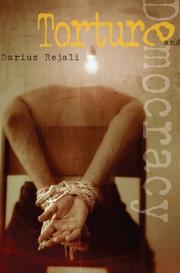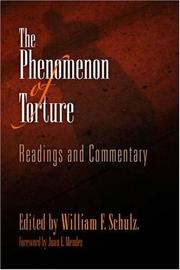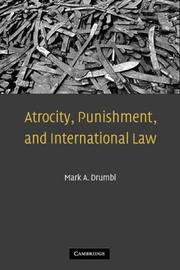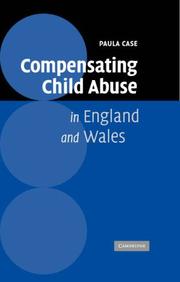| Listing 1 - 10 of 17 | << page >> |
Sort by
|
Book
ISBN: 2849670405 Year: 2007 Publisher: Checy : Coda,
Abstract | Keywords | Export | Availability | Bookmark
 Loading...
Loading...Choose an application
- Reference Manager
- EndNote
- RefWorks (Direct export to RefWorks)
Despotism. --- Despotism --- Cruelty --- Despotisme --- Despotisme --- Cruauté --- Religious aspects --- Aspect religieux
Book
ISBN: 9086860338 908686614X Year: 2007 Publisher: Wageningen, The Netherlands : Wageningen Academic Publishers,
Abstract | Keywords | Export | Availability | Bookmark
 Loading...
Loading...Choose an application
- Reference Manager
- EndNote
- RefWorks (Direct export to RefWorks)
Horses --- Animal welfare --- Behavior. --- Social aspects. --- Abuse of animals --- Animal cruelty --- Animals --- Animals, Cruelty to --- Animals, Protection of --- Animals, Treatment of --- Cruelty to animals --- Humane treatment of animals --- Kindness to animals --- Mistreatment of animals --- Neglect of animals --- Prevention of cruelty to animals --- Protection of animals --- Treatment of animals --- Welfare, Animal --- Abuse of --- Social aspects

ISBN: 9780691114224 9780691143330 0691143331 0691114226 Year: 2007 Publisher: Princeton, N.J. Princeton University Press
Abstract | Keywords | Export | Availability | Bookmark
 Loading...
Loading...Choose an application
- Reference Manager
- EndNote
- RefWorks (Direct export to RefWorks)
Torture. --- Torture --- Government policy. --- History --- Politique gouvernementale --- Histoire --- Government policy --- Cruelty --- Punishment --- Extraordinary rendition --- Torture - Government policy
Book
ISBN: 9086860257 9086865917 Year: 2007 Publisher: Wageningen : Wageningen Academic Publishers,
Abstract | Keywords | Export | Availability | Bookmark
 Loading...
Loading...Choose an application
- Reference Manager
- EndNote
- RefWorks (Direct export to RefWorks)
Animal welfare. --- Swine. --- Swine --- Behavior. --- Domestic pig --- Hogs --- Pig --- Pig farming --- Pigs --- Sus domestica --- Sus domesticus --- Sus scrofa domestica --- Sus scrofa domesticus --- Livestock --- Sus --- Abuse of animals --- Animal cruelty --- Animals --- Animals, Cruelty to --- Animals, Protection of --- Animals, Treatment of --- Cruelty to animals --- Humane treatment of animals --- Kindness to animals --- Mistreatment of animals --- Neglect of animals --- Prevention of cruelty to animals --- Protection of animals --- Treatment of animals --- Welfare, Animal --- Abuse of --- Social aspects

ISBN: 9781843922209 1843922207 9781843926344 9781134017430 9781134017508 9781134017577 9781843922193 Year: 2007 Publisher: Cullompton : Willan Pub.,
Abstract | Keywords | Export | Availability | Bookmark
 Loading...
Loading...Choose an application
- Reference Manager
- EndNote
- RefWorks (Direct export to RefWorks)
Animal welfare --- Offenses against the environment --- Crimes against the environment --- Environmental crimes --- Environmental offenses --- Offenses, Environmental --- Offenses, Pollution --- Pollution crimes --- Pollution offenses --- Crime --- Environmental sciences --- Abuse of animals --- Animal cruelty --- Animals --- Animals, Cruelty to --- Animals, Protection of --- Animals, Treatment of --- Cruelty to animals --- Humane treatment of animals --- Kindness to animals --- Mistreatment of animals --- Neglect of animals --- Prevention of cruelty to animals --- Protection of animals --- Treatment of animals --- Welfare, Animal --- Abuse of --- Social aspects --- Infractions contre l'environnement --- Pollution --- Nuisances --- Animaux --- Protection
Book
ISBN: 9782020914260 2020914263 Year: 2007 Volume: 557 Publisher: Paris : Seuil,
Abstract | Keywords | Export | Availability | Bookmark
 Loading...
Loading...Choose an application
- Reference Manager
- EndNote
- RefWorks (Direct export to RefWorks)
Civilization, Modern --- Human beings --- History --- Philosophical anthropology --- Twentieth century --- Political ethics --- Civilisation --- Homme --- Histoire --- Anthropologie philosophique --- Vingtième siècle --- Morale politique --- Philosophy --- Philosophie --- History, Modern --- Cruelty --- Philosophy, Modern --- Survival skills --- Human ecology --- Moral and ethical aspects --- Vingtième siècle --- History, Modern - 20th century - Philosophy --- Cruelty - Moral and ethical aspects --- Philosophy, Modern - 20th century

ISBN: 9780812219821 0812219821 9780812291827 0812291824 132251111X 0812203399 Year: 2007 Publisher: Philadelphia : University of Pennsylvania Press,
Abstract | Keywords | Export | Availability | Bookmark
 Loading...
Loading...Choose an application
- Reference Manager
- EndNote
- RefWorks (Direct export to RefWorks)
Torture is the most widespread human rights crime in the modern world, practiced in more than one hundred countries, including the United States. How could something so brutal, almost unthinkable, be so prevalent? The Phenomenon of Torture: Readings and Commentary is designed to answer that question and many others. Beginning with a sweeping view of torture in Western history, the book examines questions such as these: Can anyone be turned into a torturer? What exactly is the psychological relationship between a torturer and his victim? Are certain societies more prone to use torture? Are there any circumstances under which torture is justified-to procure critical information in order to save innocent lives, for example? How can torture be stopped or at least its incidence be reduced?Edited and with an introduction by the former Executive Director of Amnesty International USA, The Phenomenon of Torture draws on the writings of torture victims themselves, such as the Argentinian journalist Jacobo Timerman, as well as leading scholars like Elaine Scarry, author of The Body in Pain. It includes classical works by Voltaire, Jeremy Bentham, Hannah Arendt, and Stanley Milgram, as well as recent works by historian Adam Hochschild and psychotherapist Joan Golston. And it addresses new developments in efforts to combat torture, such as the designation of rape as a war crime and the use of the doctrine of universal jurisdiction to prosecute perpetrators. Designed for the student and scholar alike, it is, in sum, an anthology of the best and most insightful writing about this most curious and common form of abuse. Juan E. Méndez, Special Advisor to the United Nations Secretary General on the Prevention of Genocide and himself a victim of torture, provides a foreword.
Human rights. --- Torture. --- Human rights --- Torture --- Cruelty --- Punishment --- Extraordinary rendition --- Basic rights --- Civil rights (International law) --- Rights, Human --- Rights of man --- Human security --- Transitional justice --- Truth commissions --- Law and legislation --- Cultural Studies. --- Human Rights. --- Law.
Book
ISBN: 1429498315 9781429498319 0791479676 Year: 2007 Publisher: Albany State University of New York Press
Abstract | Keywords | Export | Availability | Bookmark
 Loading...
Loading...Choose an application
- Reference Manager
- EndNote
- RefWorks (Direct export to RefWorks)
The "war on terror" has brought the subject of torture to the forefront of public attention. In contrast to other discussions that focus narrowly on the practice of torture, and condemn it under any and all circumstances, Mirko Bagaric and Julie Clarke argue that to take this position is to live in a moral vacuum. The subject of torture causes our emotions to conflict with our reason. When we have a choice between saving the life of an innocent person, and not harming a terrorist or other wrongdoer, it is indecent to absolutely prefer the interests of the wrongdoer. In contrast, they propose a moral standard where each individual's interest counts equally. Within this standard, the ostensibly brutal act of torture may be permissible if it has the potential to achieve compassionate outcomes in the form of saving innocent lives.
Torture --- Political prisoners --- Human rights. --- Human rights --- Criminology, Penology & Juvenile Delinquency --- Social Welfare & Social Work --- Social Sciences --- Basic rights --- Civil rights (International law) --- Rights, Human --- Rights of man --- Human security --- Transitional justice --- Truth commissions --- Prisoners of conscience --- Prisoners --- Cruelty --- Punishment --- Extraordinary rendition --- Moral and ethical aspects. --- Abuse of --- Moral and ethical aspects --- Law and legislation

ISBN: 9780521691383 0521691389 9780521870894 0521870895 9780511611100 1107171822 0511285817 0511301715 0511611102 1280909749 0511286538 0511284233 0511285051 9780511286537 9780511285813 0511282656 9780511285059 9780511282652 9780511301711 9780511284236 9786610909742 6610909741 9781107171824 9781280909740 Year: 2007 Publisher: Cambridge New York Cambridge University Press
Abstract | Keywords | Export | Availability | Bookmark
 Loading...
Loading...Choose an application
- Reference Manager
- EndNote
- RefWorks (Direct export to RefWorks)
This book argues that accountability for extraordinary atrocity crimes should not uncritically adopt the methods and assumptions of ordinary liberal criminal law. Criminal punishment designed for common criminals is a response to mass atrocity and a device to promote justice in its aftermath. This book comes to this conclusion after reviewing the sentencing practices of international, national, and local courts and tribunals that punish atrocity perpetrators. Sentencing practices of these institutions fail to attain the goals that international criminal law ascribes to punishment, in particular retribution and deterrence. Fresh thinking is necessary to confront the collective nature of mass atrocity and the disturbing reality that individual membership in group-based killings is often not maladaptive or deviant behavior but, rather, adaptive or conformist behavior. This book turns to a modern, and adventurously pluralist, application of classical notions of cosmopolitanism to advance the frame of international criminal law to a broader construction of atrocity law and towards an interdisciplinary, contextual, and multicultural conception of justice.
Crimes against humanity --- Atrocities --- Criminal liability (International law) --- International criminal courts --- Criminal justice, Administration of --- Atrocities. --- Crimes against humanity. --- Criminal justice, Administration of. --- Criminal procedure (International law) --- International criminal courts. --- Criminal liability (International law). --- Criminal procedure (International law). --- Criminal courts --- International courts --- Complementarity (International law) --- International criminal procedure --- International criminal law --- International law --- Administration of criminal justice --- Justice, Administration of --- Crime --- Criminal law --- Criminals --- International crimes --- Genocide --- War crimes --- Military atrocities --- Cruelty --- Law and legislation --- Law --- General and Others

ISBN: 1107169224 1280815663 0511274777 0511494882 0511275471 0511273223 0511321007 0511274017 9780511274770 9780511275470 052186402X 9780521864022 9780511494888 9781107169227 9781280815669 9780511273223 9780511321009 9780511274015 Year: 2007 Publisher: Cambridge, UK New York Cambridge University Press
Abstract | Keywords | Export | Availability | Bookmark
 Loading...
Loading...Choose an application
- Reference Manager
- EndNote
- RefWorks (Direct export to RefWorks)
Providing a detailed analysis of the legal principles in England & Wales, this book looks at governing compensation claims for the lasting trauma caused by child abuse. Its pages discuss the merits and demerits of different forms of action as mechanisms for imposing liability for abuse, how compensable psychiatric damage can be proved and how the law deals with complex issues of duty of care, causation and extending limitation periods in the context of abuse cases. Whilst a substantial portion of the book deals with civil claims by the abused for the psychological harm caused by the abuse, coverage also extends to litigation by other parties involved directly or indirectly in abuse allegations. Also included is a significant comparative element, drawing upon jurisdictions such as Canada, Australia and New Zealand, as a means of speculating how our own legal system might develop.
Child abuse --- Set-off and counterclaim --- Compensation (Civil law) --- Counterclaim --- Recoupment --- Bills of particulars --- Civil procedure --- Extinguishment of debts --- Law and legislation --- Reparation (Criminal justice) --- Compensation for victims of crime --- Criminal restitution --- Reparation --- Restitution (Criminal justice) --- Restitution for victims of crime --- Remedies (Law) --- Abuse of children --- Child maltreatment --- Child neglect --- Children --- Cruelty to children --- Maltreatment of children --- Neglect of children --- Child welfare --- Family violence --- Parent and child --- Abused children --- Abuse of --- Crimes against --- Law --- General and Others
| Listing 1 - 10 of 17 | << page >> |
Sort by
|

 Search
Search Feedback
Feedback About UniCat
About UniCat  Help
Help News
News